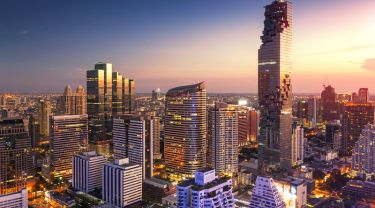
Doing business in Thailand: Opportunities for Canadian companies
Author details
Cindy Lim
EDC chief representative, Thailand
In this article:
Hundreds of thousands of Canadians visit Thailand each year, lured by white sand beaches, historic Buddhist temples and exciting cuisine. But this country of 71.7 million is more than a tourist hotspot. For Canadian exporters, it’s an increasingly lucrative market for a diverse range of products and services.
“Thailand is at a stage where consumers are moving up the value chain, creating demand for premium and value-added products that align well with Canadian export strengths in a number of key areas,” says Nathan Nelson, regional vice-president, South and Southeast Asia, at Export Development Canada (EDC). “Thailand presents significant opportunities for Canadian exporters looking to diversify beyond traditional markets.”
Recognizing the market’s potential, EDC will open a new representation in Bangkok in 2025. Our in-market team will focus on creating new pathways for Canadian companies to do business in Thailand and take full advantage of its opportunities.
Once a largely agrarian country, Thailand has transformed over the last several decades into a modern, industrialized economy with a gross domestic product (GDP) of approximately US$534 billion in 2024 and an average projected growth rate of 3.1% over the next five years. Today, Thailand is a key player in Southeast Asia, boasting the region’s second-largest economy and serving as a vital hub for trade and investment.
The country has steadily advanced its growth strategy over the years. In 2018, the Thai government approved the creation of an Eastern Economic Corridor (EEC), with the goal of turning the eastern provinces of Chonburi, Rayong and Chachoengsao into a special economic zone within the Association of Southeast Asian Nations (ASEAN).
“The EEC is a long-term, government-driven strategic initiative—spanning 2016 to 2036—that focuses on 12 priority sectors, including aviation, next-generation automotive, smart electronics and digital industries,” says Martin Beaulieu, a Canadian business advisor specializing in the Thai market. “Through targeted development of these sectors, the EEC aims to establish Thailand as a regional leader in key industries and as an ASEAN economic powerhouse.”

According to Nadeem Rizwan, an economist and country risk analyst at EDC’s Economic and Political Intelligence Centre, Thailand has a substantial import market valued at approximately US$350 billion.
Rizwan cites the country’s economic stability, bolstered by a consumer base with high purchasing power. With a nominal income per capita of around US$7,500 in 2024, Thailand has evolved into an upper-middle income country. By comparison, nominal income per capita is less than US$5,000 in Indonesia and just US$4,000 in the Philippines.
Thailand has set a goal to achieve high-income status—which, in 2024, had a threshold of US$14,005 in inflation-adjusted terms annually—by 2036, and is trending in the right direction. In addition to a near tenfold increase in its nominal per-capita income over four decades since 1980, Thailand has reduced its national poverty rate to 8.2% in 2024 from 43% about two decades earlier, according to the World Bank Group.
“If you’re a Canadian exporter considering expansion into Asia, you can’t ignore Thailand—one of the largest economies in the region with high purchasing power,” says Rizwan. “This is a market with significant potential that’s attracting the attention of Canada and other countries that have their own Indo-Pacific strategy.”
Thailand offers a business environment that’s conducive to international trade and investment. The country has a stable regulatory framework and most of its residents speak English. Nelson notes that Thailand’s mature banking sector makes it easier for foreign businesses to manage trade transactions and secure financing.

“The capital city of Bangkok is among the region’s largest financial hubs and it continues to grow,” he says. “Thailand’s sophisticated banking sector makes a huge difference when doing business here.”
A well-established ecosystem of business service professionals and advisors such as lawyers, accountants and business advisors add to the ease of doing business in Thailand, says Beaulieu.
With its strong economy, high purchasing power and ambitious growth strategy, Thailand represents a promising market for Canadian exporters with opportunities across a wide range of sectors:
- Agri-food and protein alternatives. While traditional exports such as seafood, pork and beef continue to thrive, there’s growing interest in alternative proteins and value-added food products. Nelson says Thailand’s growing middle class is shifting towards higher-value food products, including plant-based protein—areas of opportunity where Canada excels. Thailand also has a Muslim population of about 7.5 million, representing a potential market for halal foods.
“Canada’s strength in seafood, pulses and premium packaged food products also aligns well with Thai consumer demand,” says Nelson.

Canadian food exporters should be mindful of local preferences, says Tammy Huston, EDC’s Indo-Pacific director. Thais, in general, have a sweeter palate, and local foods and drinks tend to be more sugary than what Canadians are used to. At the same time, savoury and snack foods tend to have more fish-based flavours, she says.
- Infrastructure and transportation. Canadian firms that specialize in engineering, transportation technology and smart infrastructure solutions could find ample opportunities in Thailand. Rizwan says the Thai government is investing heavily in infrastructure projects, particularly in smart infrastructure, energy and transportation. In recent months, Thailand has announced plans for 223 infrastructure projects in 2025, valued at approximately US$4 billion, as well as 64 additional projects in 2026 worth US$3.5 billion.
The country’s infrastructure expansion includes high-speed rail connecting three airports, deep-sea port expansion, a major international airport upgrade and the development of industrial ports. These large-scale projects align with Canada’s strengths in infrastructure development, engineering and transport technology, creating significant opportunities for collaboration, says Beaulieu.
They should also make it easier, once completed, for Canadian exporters to get their products to Thailand and into the market.
“This push toward enhanced logistics and connectivity means that companies exporting to Thailand can expect more streamlined supply chains and distribution networks,” says Beaulieu.
- Clean technology and renewable energy. Thailand is on a mission to achieve carbon neutrality by 2050 and net zero emissions by 2065. This ambition is expected to generate approximately US$85 billion in capital investment in clean energy projects over the next decade, says Rizwan.
“The Thai government’s National Energy Plan is a major driver of this transition, focusing on renewable energy and infrastructure upgrades,” he says. “This could mean new markets for Canadian companies specializing in renewable energy, energy efficiency solutions and sustainable technologies.”
- Digital economy and information and communication technology (ICT). The Thailand 4.0 initiative aims to position the country as a leading digital hub in ASEAN, with a focus on 12 fields, ranging from automation and robotics to aviation, logistics, biofuels, biochemicals and digital. Toward this end, Thailand’s investments in artificial intelligence (AI), fintech and e-commerce infrastructure have skyrocketed, creating avenues for Canadian firms with expertise in AI, cybersecurity and digital transformation solutions. The country’s push to modernize its power grid—it’s announced a large-scale project to bury transmission lines underground, says Huston—will likely create additional opportunities in tech-driven energy solutions.
- Aerospace and MRO. Thailand is building its aerospace industry—a sector in which Canada shines—and positioning itself as a maintenance, repair and overhaul (MRO) services hub in Southeast Asia. Its strategic location gives it a competitive advantage in this market. It also has a well-established aviation infrastructure, with the U-Tapao International Airport identified as a key site for MRO development under the EEC initiative.
Thailand is strategically positioned in Asia, forming a triangle with China, India and Australia, while also accounting for ASEAN as a whole, representing close to 700 million people,” says Beaulieu. “This makes it an ideal location for an aviation and MRO hub."
Singapore is currently the leading regional hub for MRO services, but due to space constraints and expansion limits, Thailand is emerging as a competitive alternative, he adds.
“With its growing aviation infrastructure and government-backed incentives, Thailand presents significant opportunities for Canadian aerospace firms to contribute expertise in MRO, aircraft parts and aviation technology,” says Beaulieu. “Canada has the aerospace experience and expertise to help Thailand achieve this goal.”
- Education and training. Thailand’s commitment to upskilling its workforce and improving educational standards translates to potential opportunities for Canadian universities, vocational training institutes and ed-tech companies. The increasing proficiency in English among Thailand’s workforce further facilitates collaboration with international educational providers.
- Filmmaking industry expansion. Beaulieu says Thailand is expanding its filmmaking and post-production sector, including animation, digital effects and production services.
“The EEC has identified this as a new strategic industry, and I have started discussions with Canadian production and animation studios to explore potential partnerships,” he says. “This presents fresh opportunities for Canadian creative firms looking to expand in Asia.”
Canadian companies looking to do business in Thailand have certain advantages over companies in other countries. Canada and Thailand share a robust trade relationship, with bilateral trade reaching $6.4 billion in 2024. This solid foundation, coupled with Thailand’s integration into ASEAN’s extensive trade networks, creates a fertile ground for expanding Canadian business interests.
Although the two countries don’t have a direct free trade agreement, Thailand’s participation in the ASEAN Free Trade Area offers benefits for Canadian exporters. Canada’s involvement in the Comprehensive and Progressive Agreement for Trans-Pacific Partnership (CPTPP) also strengthens its trade position in the region.
While Thailand is a business-friendly country, Canadian exporters need to be well-informed about the regulations—including import tariffs —and bureaucratic complexities affecting trade in your sector.
Foreign ownership rules: Beaulieu says Canadian companies should familiarize themselves with rules related to foreign business ownership—as a general rule, non-Thais can own only up to 49% of capital shares, but there are exceptions—and labour laws.
“Foreign companies in Thailand must comply with local labour laws, including the standard 1:4 foreign-to-Thai employee ratio, meaning that for every foreign worker, at least four Thai employees must be hired," says Beaulieu. "However, businesses operating under Thailand Board of Investment promotion, or within the EEC, may be exempt from these requirements, providing greater flexibility in workforce planning.”
A different business culture: Understanding the differences in local culture and business etiquette is important, says Huston.
“Thailand has a strong cultural emphasis on respect, particularly in business,” she says. “Meetings are formal and hierarchy is important.”
Thai business culture is polite and less direct compared to North American business culture. Canadian companies should be prepared for a longer decision-making process and not assume that initial enthusiasm will translate into immediate contracts, says Huston.
“Relationship-building is critical,” she adds. “Successful foreign companies in Thailand have invested in long-term partnerships and in-market presence rather than short-term transactional approaches.”
Environmental, Social and Governance (ESG) considerations: Companies should ensure compliance with local environmental regulations and labour laws, promote sustainable practices, and address risks related to human rights. Extra vigilance is needed in certain sectors. To reduce ESG risk, Canadian exporters should also conduct proper due diligence on potential partners, suppliers and customers.
Despite these challenges, Canadian businesses can succeed in Thailand by leveraging resources and support from EDC and the Canadian Trade Commissioner Service (TCS).
EDC is part of the Government of Canada’s trade ecosystem of experts available to help Canadian exporters make connections, gain insights into target markets, and secure the capital needed for growth.
As part of our Indo-Pacific strategy, EDC’s committed to helping Canadian companies diversify into new markets and succeed in this dynamic region. The upcoming opening of our representation in Bangkok will provide Canadian exporters with vital on-the-ground support in navigating the market in Thailand. Our Bangkok team looks forward to connecting with Canadian companies and helping you access critical market intelligence, local contacts and our financial tools, like EDC’s trade credit insurance.
Offering credit and flexible payment terms, supported by EDC’s credit insurance, can give Canadian companies a competitive edge in a market where flexible financing is key.
EDC also offers:
- Guarantees to help you secure access to working capital
- Market intelligence to gain deeper insights into international markets
- Financing solutions designed to give you a competitive edge and help you pursue more opportunities
- Connections to international companies seeking your products and services
Learn more about how EDC’s financial and knowledge solutions can help you understand the opportunities in your target market and make exporting less risky. To contact an EDC export advisor, visit our Export Help Hub.
Connect with EDC and watch your business flourish on the international stage.
Answer a few questions about your company to learn more about how EDC can help you plan, connect and fuel your expansion in the Indo-Pacific.















